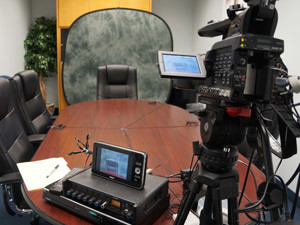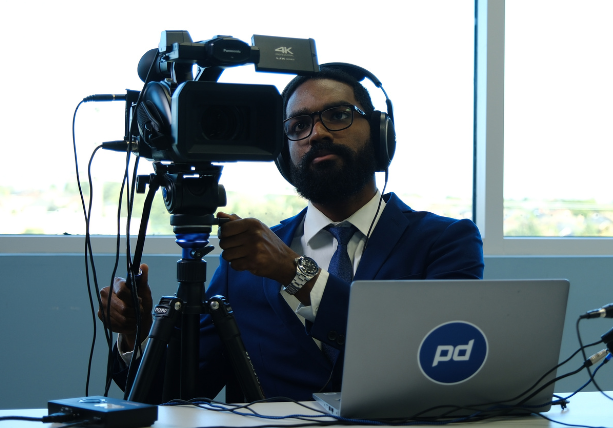How attorneys can use legal video depositions to challenge inconsistent testimony
The Relevance of Lawful Video Clip Depositions in Modern Legal Providers: What You Must Know
Legal video depositions have actually ended up being necessary in today's legal landscape. They provide a multidimensional sight of witness testimonies that traditional transcripts just can not match. By recording both verbal and non-verbal communication, these depositions improve the total understanding of a witness's reputation. However, the efficiency of video depositions hinges on different variables, consisting of conformity with legal standards and ideal practices (legal video depositions). Checking out these aspects discloses their real relevance in modern-day legal solutions
What Are Lawful Video Depositions?
Lawful video clip depositions work as an important tool in the lawsuits process. They involve recording witness statements in a video clip style, catching both non-verbal and verbal communication. This approach allows lawyers to record the temperament, expressions, and reactions of witnesses, giving a richer context for the testimony. Generally conducted in a controlled environment, these depositions are led by lawyers that ask concerns while a stenotype reporter records the discussion. The resulting video can be important for test preparation, as it enables attorneys to examine the integrity of witnesses and improve their approaches. Additionally, legal video depositions can be made use of in different legal contexts, ranging from civil disagreements to criminal instances. The acoustic and visual elements of video depositions improve the discussion of evidence, making it a necessary element in the modern-day lawful landscape. In general, they add considerably to the performance and effectiveness of lawful proceedings.

Benefits of Video Clip Depositions Over Standard Methods
Video depositions supply countless advantages contrasted to typical techniques of taking witness testimonies. One significant advantage is the capacity to capture both visual and audio components, offering a more comprehensive document of the witness's statements. This double format improves clarity and permits attorneys to reference particular subtleties throughout test preparation. In addition, video depositions promote remote participation, making it less complicated for witnesses who may be inaccessible for in-person looks due to geographical constraints or wellness issues.Moreover, video depositions can quicken the total deposition procedure, lowering the moment and expenses related to traveling and logistics. They also boost ease of access, as recorded depositions can be easily shared amongst lawful teams and referenced any time. This convenience contributes to much better case management and preparation. Generally, video clip depositions represent a contemporary, effective technique to collecting witness testimonies, aligning with the evolving requirements of the legal profession.
The Function of Body Language and Tone in Testimonies

In legal video clip depositions, body language and tone play crucial duties in sharing a witness's credibility and reliability. Nonverbal hints can offer understandings right into a witness's emotional state, affecting just how their testimony is perceived. Comprehending the influence of these components is important for jurors and attorneys alike when assessing the integrity of a testimony.
Nonverbal Communication Insights
While verbal interaction is commonly stressed in legal testimonies, nonverbal cues such as body movement and tone play an essential role in sharing reputation and emotion. Viewers of depositions may note that a witness's position, motions, and faces can greatly affect perceptions of reliability. Consistent eye contact might signal self-confidence, while avoiding stare could recommend deceit or pain. Likewise, the intonation-- its volume, pitch, and pace-- can pass on feelings of genuineness or unpredictability. Lawyers must be attuned to these nonverbal signals, as they frequently supply vital context that matches spoken words. Recognizing these subtleties can boost the performance of depositions and affect the result of legal process.
Psychological Tone Impact
The emotional tone conveyed throughout lawful testimonies significantly impacts how a witness is viewed. Body language, vocal inflections, and faces play important roles in forming the story of a testimony. A witness showing self-confidence via constant eye get in touch with and a calm tone can instill a feeling of integrity and involvement. On the other hand, signs of anxiousness, such as fidgeting or a shaky voice, may bring about apprehension concerning their account. The subtleties of emotional expression can affect the interpretation of facts, making it vital for lawyers to acknowledge these cues. In video depositions, the auditory and aesthetic elements incorporate, highlighting the value of psychological tone in our website communicating genuineness and truthfulness within the lawful procedure.
Reputation and Reliability
A vital consider establishing credibility and reliability throughout statements lies in the witness's body language and tone of voice. Viewers frequently depend on non-verbal hints-- such as eye contact, stance, and gestures-- to evaluate a witness's sincerity. As an example, a witness that keeps eye get in touch with and presents open body movement may be perceived as more trusted and straightforward than one that avoids eye contact or appears closed off. Furthermore, intonation plays an essential function; a stable, tranquil tone can strengthen the reliability of the testimony, while changes in pitch or quantity may elevate doubts. Eventually, the mix of body language and vocal tone greatly affects just how a witness's statements are obtained and interpreted in a legal context.
Ideal Practices for Conducting Video Depositions
Conducting video clip depositions requires mindful planning and execution to ensure a clear and efficient discussion of statement. It is vital to choose a silent, well-lit place to lessen interruptions and protected optimum video high quality. The devices needs to be checked beforehand, consisting of electronic cameras, microphones, and lighting, to avoid technical problems throughout the deposition.Next, celebrations entailed should assess the format and treatments ahead of time, seeing to it that every person understands their functions. The deponent needs to be briefed on the procedure, consisting of how to respond plainly and concisely.Additionally, maintaining an expert disposition throughout the session is crucial. This includes avoiding talking over each other and confirming that all concerns are routed suitably. It is important to videotape the deposition in a format that allows for very easy playback and review, preserving the integrity of the testimony for future use.
Legal Considerations and Compliance Issues
How do legal considerations and compliance issues impact the effectiveness of video clip depositions? Attorneys must navigate a complex landscape of regulations, guaranteeing that video depositions comply with jurisdictional rules and standards. Conformity with regulations worrying privacy, permission, and tape-recording techniques is vital. Getting explicit consent from all events entailed is required to avoid legal repercussions.Additionally, the admissibility of video clip evidence in court can pivot on conformity with procedural needs. Guaranteeing that the equipment made use of satisfies technological requirements is also important, as inadequate high quality can undermine the deposition's reliability.Moreover, lawyers need to be aware of any kind of certain state laws view publisher site that regulate video depositions, as these can differ considerably. Failure to deal with these considerations can not just endanger the honesty of the deposition however likewise influence the general instance technique, ultimately influencing the client's lawful outcomes.
Exactly How Video Clip Depositions Impact Court Understanding
While video depositions can act as powerful devices in legal procedures, their impact on jury understanding is significant. The aesthetic and acoustic aspects of video recordings provide jurors with an extra detailed understanding of witness attitude, reliability, and emotional feedbacks. This multimedia method can boost the jurors' ability to examine the reliability of testimony compared to standard text-based transcripts.Moreover, video clip depositions allow jurors to observe body language, tone of voice, and faces, every one of which can influence their analysis of the witness's statements. The presence of a witness on screen can humanize them, fostering compassion and link, which might persuade jurors' viewpoints. Alternatively, a witness that shows up incredibly elusive or untrustworthy on video may result in negative understandings that influence a court's decision. Inevitably, the vibrant nature of video depositions plays a crucial function fit exactly how jurors translate proof and reach their judgments.
The Future of Video Clip Depositions in Legal Method
As improvements in innovation continue to reshape the lawful landscape, the future of video clip depositions is poised for significant evolution. Technologies such as expert system, virtual fact, and boosted video conferencing tools are anticipated to enhance the deposition process and boost access. Attorneys might use AI-driven analytics to assess witness reliability and instance toughness a lot more effectively.Moreover, the integration of digital truth could enable juries to experience immersive simulations of depositions, supplying deeper context and understanding. In addition, the trend towards remote depositions is likely to linger, providing better versatility for lawyers and clients alike.As remote job becomes progressively normalized, video depositions will likely come to be common practice, minimizing costs and time restrictions connected with conventional approaches. In general, these technical innovations guarantee to boost the efficiency, efficiency, and access of video depositions in legal technique, ultimately transforming exactly how attorneys get ready for test.
Frequently Asked Concerns
Just How Much Do Legal Video Depositions Typically Expense?

Can Video Clip Depositions Be Made Use Of in Any Type Of Kind Of Situation?
Video depositions can be utilized in numerous kinds of instances, consisting of civil, criminal, and household legislation. Their flexibility allows attorneys to present witness testimonies efficiently, adapting to the specific needs of various legal circumstances.
What Devices Is Required for a Video Clip Deposition?
To conduct a video clip deposition, necessary equipment consists of a high-quality camera, microphone, illumination, and a trusted recording tool. Furthermore, a computer with editing software program might be needed for post-production and formatting the last video.
How much time Does a Regular Video Deposition Last?
A typical video deposition lasts between two to four hours, depending on the intricacy of the situation and the variety of inquiries presented. Extended sessions may take place, however breaks are normally included for participant comfort.

Are Video Depositions Admissible in Court?
Video clip depositions are typically admissible in court, given they stick to lawful requirements and guidelines of proof. Their use improves clarity and protects witness testament, helping in the judicial procedure during trials and hearings. Lawful video depositions have come to be vital in today's lawful landscape. Additionally, legal video clip depositions can be made use of in various legal contexts, varying from civil disagreements to criminal cases. Furthermore, video clip depositions promote remote participation, making it much easier for witnesses that might be inaccessible for in-person looks due to geographical constraints or health issues.Moreover, video clip depositions can quicken the overall deposition process, decreasing the time and expenses connected with travel and logistics. Making sure that the devices utilized meets technical standards is additionally important, as inadequate top quality can read more threaten the deposition's reliability.Moreover, lawyers should be aware of any specific state regulations that control video depositions, as these can vary greatly. In addition, the pattern toward remote depositions is most likely to continue, using greater adaptability for attorneys and customers alike.As remote work becomes significantly normalized, video clip depositions will likely become standard technique, decreasing prices and time restrictions linked with conventional approaches.